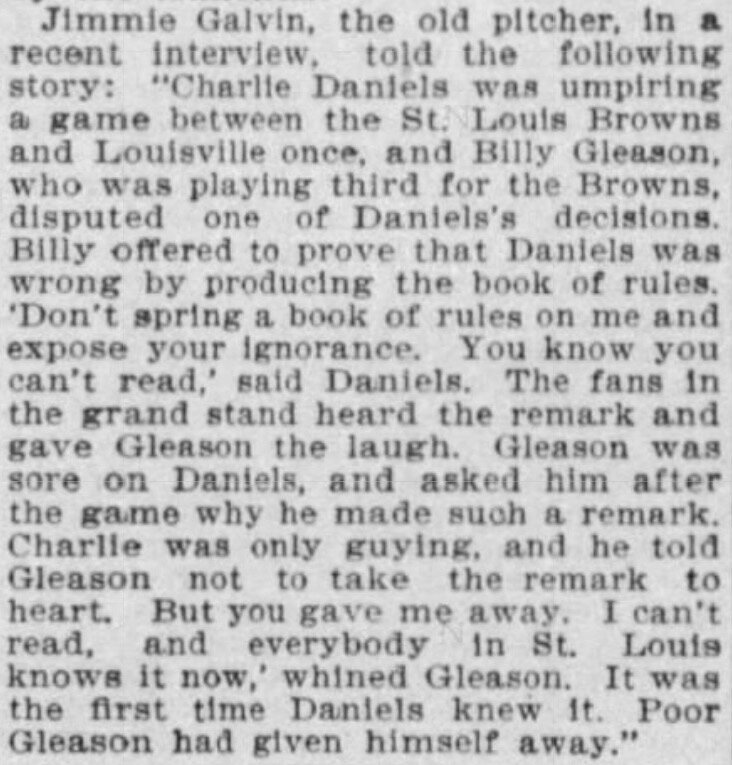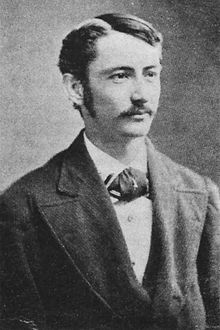Charles F. Daniels was born in Colchester, Connecticut, on March 13, 1849. He moved to Hartford as a young adult and became a pitcher for the Hartford Amateurs, a club comprised of the city’s best talent. However, the 25 year old Daniels discovered his place to be behind the plate. He began his umpiring career in Hartford officiating minor league, college and amateur games. His professional umpiring debut was September 7, 1874, in a National Association matchup between the Hartford and Brooklyn clubs.
Daniels was reported in the newspaper as “Umpire Daniels of Hartford Amateurs.” He would go on to serve 13 seasons as a highly regarded figure in the National Association (1874-1875), the National League (1876, 1878-1880, 1887-1888), and the American Association (1883-1885, 1889). In the early days of professional baseball, Daniels was a top rated umpire. He was popular with most players and fans. He presided over multiple historically significant games. He called two no-hitters; the first in major league history, and the other a perfect game. In 1875, Daniels officially umpired 22 games, all but one as the lone arbiter on the field.

Around midseason, Daniels had a personal dispute with bar owner Matthew M. Coughlin. He once used to work as a barkeeper at Coughlin’s bar on Front Street and rumors spread about Daniels having an affair with Coughlin’s wife. After returning from umpiring a game in New York, Daniels was threatened and chased around downtown Hartford by an enraged Coughlin. In response, Daniels drew a weapon and fired three times in Coughlin’s direction but missed. Daniels was charged for assault with intent to kill but later proven innocent on the grounds of self-defense.

When the American Association dissolved in 1876, Daniels latched onto the newly formed National League. That season he called 45 games. Daniels supervised the first no-hitter recognized by Major League Baseball: George Bradley of St. Louis Brown Stockings blanked the Hartford Dark Blues, 2-0 on July 15, 1876. Because he adjudicated so many important big league games as compared to his peers, Daniels became a trusted judge of the game. He earned a reputation as a pioneer of the umpiring craft and his services were in demand.
Daniels was the first umpire to run from home plate to another base to get a better angle on close call. He revolutionized the role of umpire by setting new norms. He was one of the first umpires to wear protective equipment such as shin guards. His expertise was known throughout baseball circles and by the end of 1876, Daniels was summoned to preside over a championship series between Chicago and St. Louis. A special train was sent to collect Daniels and deliver him to St. Louis where he earned $400 with travel expenses paid. Daniels did not appear as umpire on the major league level in 1877.
He returned in 1878 for 9 games and another 46 games in 1879. He called 28 games in 1880, including the second perfect game in major league history by John Montgomery Ward. During the 1883 season game totals increased significantly with the American Association, earning $10 per game. Daniels umpired 91 games in 1884 and stayed with the American Association until 1885. While in the midst of a famous umpiring career, Daniels opted for a change of roles. In 1886 and 1887, he became manager of the Hartford Base Ball Club in the Eastern League. During this time, Daniels was credited with scouting a young catcher named Connie Mack but later sold him to Washington.

After an unsuccessful pursuit as Hartford manager, Daniels resumed umpiring in 1888 and compiled a career high of 110 games. During his final season as a professional umpire in 1889, he officiated 19 contests for the American Association. His career totals were 504 games over 13 seasons. Without official baseball duties, Daniels seemed to lose hope. He suffered from a serious case of alcoholism and in 1890, Daniels checked into the Hartford Retreat and made a recovery. In 1897, Daniels made a comeback as Hartford’s alternate umpire in the Atlantic League.

At the time of the 1930 United States Census, Daniels was living in a rented home on Parham Road in Colchester with his brother Robert. His occupation was noted as a farmer. Then he moved in with his brother Eugene on a farm in Colchester off of New London-Hartford Road. On March 21, 1932, Daniels was found lying unconscious in a ditch where he had apparently fallen during a snowstorm. A head wound and exposure to the elements resulted in his death two days later. Umpire Charlie Daniels died at Backus Hospital in Norwich, Connecticut, at the age of 83.

“Don’t spring a book of rules on me and expose your ignorance. You know you can’t read.”
Umpire Charlie Daniels to Kid Gleason in 1894.

Sources
1. Hartford Courant Database accessed on Newspapers.com
2. Baseball-Reference.com




























